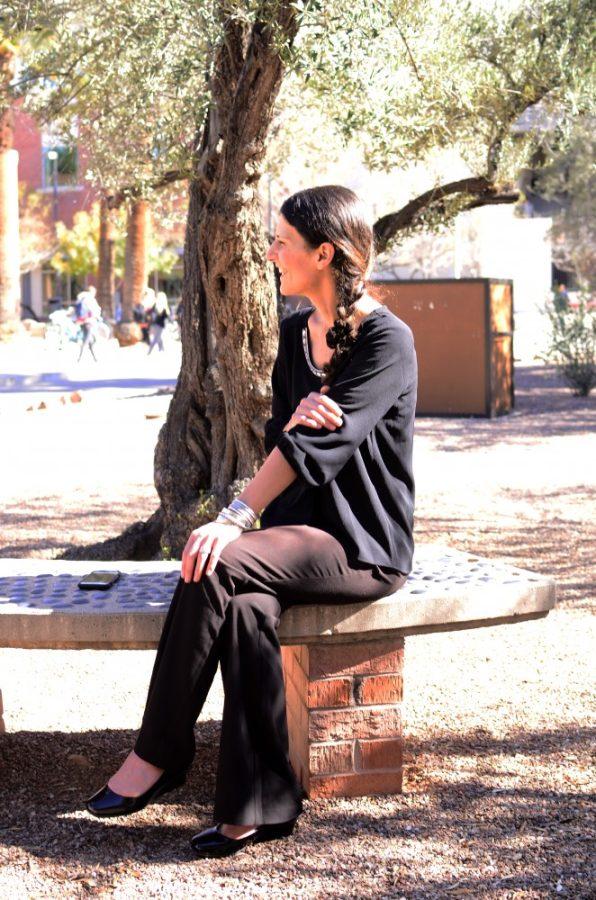Associate professor in civil engineering and engineering mechanics Katerina Aifantis didn’t follow the traditional academic career path. In fact, you could say she left the path altogether, opting instead to head for the open road. While her educational journey was certainly unconventional, it has yielded unprecedented success.
“I think students should fight for what they’re worth because they pay to get a good education and they should make the most out of it, not be bound by whatever they’re told the traditional path of a student should be,” Aifantis said.
Aifantis has certainly embodied that motto. At age 21, she was the youngest person in the Netherlands to ever obtain a Ph.D. And while most students can barely manage to get to class on time, at age 24, Aifantis was leading a 5-year research study with a 1.5-million dollar grant from the European Research Council.
Recently, Aifantis was also the recipient of a grant from the United States Department of Energy to study material bonding at the nano-scale. For many people, her area of research may seem complicated and extremely technical. However, she sees it a different way.
“When theory and experiment combine, when you’re able to see an equation fall on the experimental data, I think that’s just beautiful and it’s exciting,” Aifantis said.
As a child, Aifantis said she split her time between Greece and Michigan, attending school in both countries before deciding to stay in the United States for high school. At the age of 16, she joined a program that allowed her to take classes from the university while still attending high school.
“That’s one of the great things in this country is if you really want something, there are ways to do it and I really wanted to get ahead in my studies and learn all about science, so I was able to start college fairly young and then I took the heaviest course load you could, so I could finish fast,” Aifantis said.
After taking university-level math and chemistry courses, Aifantis received permission to bypass her 12th grade of high school entirely and fully pursue a bachelor’s degree. She explained that despite initial opposition from the university administration, her determination carried her through.
Aifantis received her bachelor’s degree at the age of 19 and then received a National Science Foundation grant which allowed her to go to graduate school at the University of Cambridge. She said throughout her education, her purpose was to learn enough so that she could understand what her father was studying.
“When I had to choose my major, I decided to go into engineering since I wanted to see what my dad was trying to figure out,” Aifantis said. “But I never thought this would be what I would be doing as a career, I saw it more as a game.”
RELATED: UA experts weigh-in on NASA’s EM Drive
Following a year of intense studying at Cambridge, Aifantis finished the necessary research for her PhD. At the recommendation of her advisor, mathematician John Willis, Aifantis then went to the University of Groningen in the Netherlands in order to bypass Cambridge’s time-in-program requirements. She was awarded the degree at age 21.
“I didn’t have a plan of what I was going to do after my Ph.D., but then by the time I finished, I realized I really liked research and I wanted to keep doing it,” Aifantis said.
After applying for a prestigious grant from the European Research Council on a whim, Aifantis was surprised when the grant was awarded to her. She said the average age of recipients was 35, but she was only 24 at the time.
Aifantis’ research spans a wide array of topics, including nanotechnology, biomedical engineering and improving lithium ion batteries.

“My mother was the one who was always telling me, ‘you should try and get into bio engineering, you work so hard, why not work so hard for something that can actually affect people first hand?’” Aifantis said.
Now as a professor, Aifantis hopes to bring different disciplines together and change the way researchers look at problems.
RELATED: UA researcher snags Air Force grant for transistors
“Because I started out young, I have maybe a more non-conventional approach to things, where you know, if you start doing your Ph.D. when you are 25, versus starting your Ph.D. at 20, you’ve probably spend a lot of time in a particular discipline and you think a particular way,” Aifantis said.
Her unique outlook has had an impact on the students she works with.
“The number one important thing I learned is the ability to think more wisely,” said Haokun Deng, a postdoctoral research associate in civil engineering and engineering mechanics. “She taught me to combine three different majors into one new research group and this is the most valuable ability I learned from her.”
Deng said sometimes young researchers and young professors are refreshing in their field.
Giving undergraduate research experience to her students is a top priority, Aifantis said. At the end of every semester, she invites her students to join her in her research lab or for independent study.
“She’s really made an impact socially and educationally in helping me have a research position that could put me in the forefront of competition when it comes to job dedication,” said Fabian Medina, mechanical engineering and mathematics senior.
When asked about her best advice for students, Aifantis responded with enthusiasm.
“Your generation is going to shape our future, so try to make the most of it and think creative,” Aifantis said.” Think out of the box, I think that’s the most important thing, and never lose hope; never let difficult circumstances put you down.”
Follow Hannah Dahl on Twitter.









